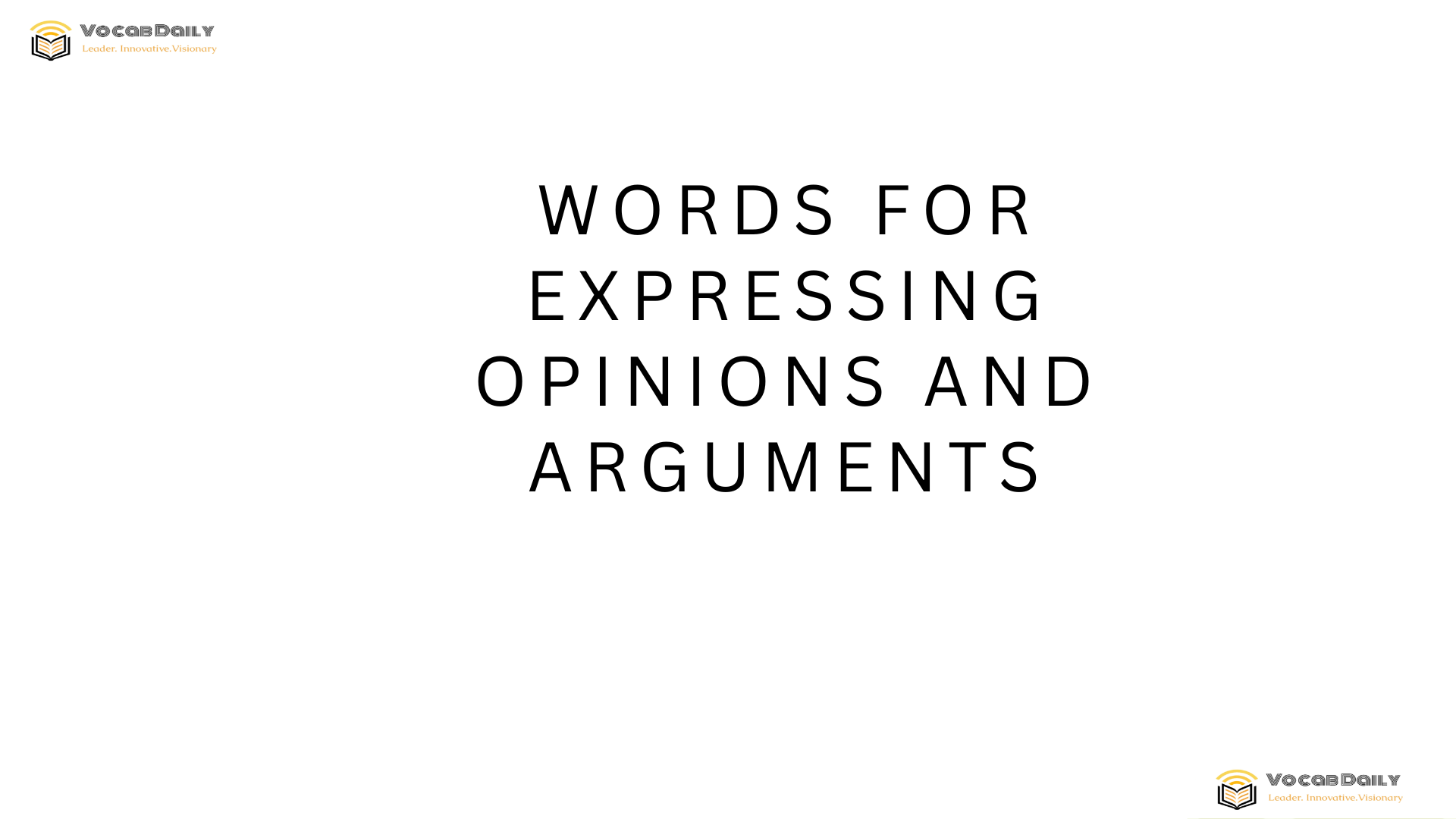Words for Expressing Opinions and Arguments
Why Expressing Opinions Clearly is Important
When learning English, one essential skill is knowing how to effectively express opinions and make arguments. Whether you are writing an essay, participating in a debate, or just sharing your thoughts in everyday conversation, using the right vocabulary helps you communicate your ideas clearly and persuasively. This article will introduce you to a variety of useful words and phrases that can help you express opinions and build arguments confidently and appropriately.
Basic Words for Expressing Opinions
At the core of opinion expression are some simple words that help you state what you think or feel. These words are helpful when you want to share your personal viewpoint without sounding too forceful or argumentative.
-
I think
-
I believe
-
In my opinion
-
It seems to me
-
From my perspective
-
As far as I’m concerned
Using these phrases at the start of a sentence signals to the listener or reader that what follows is your personal view. They are neutral and polite, making them suitable for formal and informal situations alike.
Stronger Words for Giving Opinions
If you want to emphasize your opinion or show more confidence in what you’re saying, you can use stronger expressions. These words indicate that you feel strongly about your point.
-
I strongly believe
-
I am convinced that
-
There is no doubt that
-
I firmly think
-
Without question
These phrases help you make your point with conviction, which is useful when you want to persuade others or highlight the importance of your opinion.
Phrases for Agreeing With an Opinion
In conversations and writing, it’s common to agree with someone else’s opinion. Doing this clearly and politely can help maintain a positive tone and encourage further discussion.
-
I agree with you
-
You’re right
-
That’s a good point
-
I share your view
-
Absolutely
-
I couldn’t agree more
These phrases help you show support for another’s opinion while keeping the conversation respectful and engaging.
Phrases for Disagreeing Politely
Disagreeing can sometimes be uncomfortable, but using polite language makes it easier and more productive. These phrases allow you to express disagreement without sounding confrontational or rude.
-
I’m afraid I don’t agree
-
That’s one way to look at it, but
-
While I understand your point, I think
-
I see what you mean, however
-
Respectfully, I disagree
-
I’m not convinced that
Using these phrases gives you the opportunity to express an alternative viewpoint thoughtfully and constructively.
Words for Supporting Your Arguments
When making an argument, it is important to provide evidence or reasons to support your opinion. These transition words and phrases help link your ideas and strengthen your argument.
-
Because
-
Since
-
Due to
-
For example
-
In addition
-
Furthermore
-
Moreover
-
As a result
-
Therefore
-
This shows that
These words make your writing or speaking clearer and more logical by connecting your main ideas with your evidence and explanations.
Words for Expressing Uncertainty or Partial Agreement
Sometimes you may want to express your opinion cautiously or partially agree with part of an argument. Here are some useful phrases to do so:
-
Perhaps
-
Maybe
-
It could be that
-
To some extent
-
In some ways
-
Although
-
While it is true that
-
On the other hand
These phrases help you express nuanced opinions and acknowledge different viewpoints, which is often necessary in balanced discussions.
Phrases for Presenting Opposing Arguments
When you want to discuss or refer to the other side of an argument, you can use these introductory phrases to highlight or introduce opposing views:
-
Some people argue that
-
It is often claimed that
-
Opponents believe that
-
On the contrary
-
However
-
Nevertheless
-
Despite this
Including opposing viewpoints shows that you have considered all sides of the issue, which strengthens your credibility.
Common Adjectives and Adverbs to Strengthen Your Arguments
Adjectives and adverbs can add emphasis and clarity to your opinions and arguments. Here are some examples frequently used in English:
-
Convincing
-
Plausible
-
Reasonable
-
Valid
-
Strong
-
Weak
-
Clearly
-
Clearly
-
Undoubtedly
-
Clearly
-
Persuasively
Using these words can help you describe the quality of arguments or opinions you are discussing.
Useful Nouns for Expressing Opinions and Arguments
To talk about opinions and arguments more formally, you can use these nouns:
-
Viewpoint
-
Perspective
-
Opinion
-
Argument
-
Claim
-
Evidence
-
Reason
-
Conclusion
These nouns help you describe the structure of your ideas in essays, presentations, and discussions.
Tips for Using Opinion Vocabulary Effectively
Here are some helpful tips when using words for opinions and arguments:
-
Choose words that match your level of certainty. For example, use “I think” for less certain opinions and “I am convinced” when you are very sure.
-
Be polite when disagreeing to foster respectful communication.
-
Support your opinions with reasons and examples to make them more convincing.
-
Use transition words to connect your ideas clearly.
-
Practice using these phrases in speaking and writing to become more comfortable expressing opinions and arguments.
Expanding Your Vocabulary for Discussions
To continue improving, read articles, watch debates, and listen to podcasts where people express views on various topics. Pay attention to the vocabulary they use and try to incorporate it into your own language. The more you practice, the more natural and effective your communication will become.
Also check out VocabDaily workbook collections.

Leave a Reply